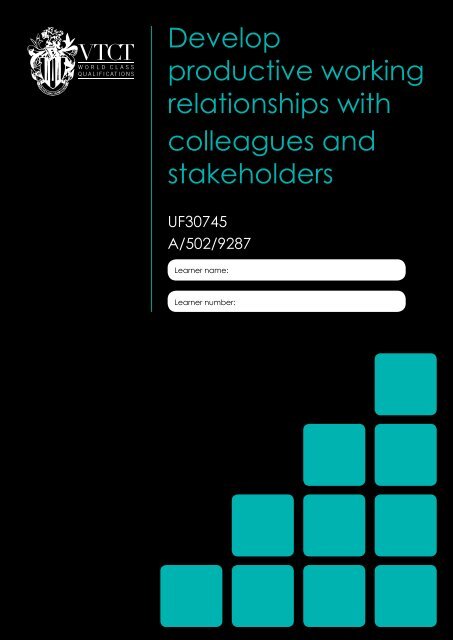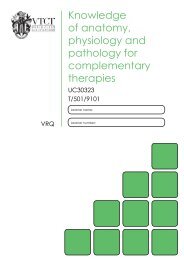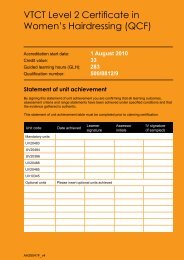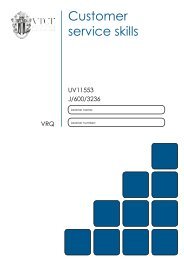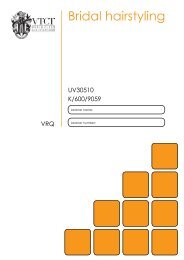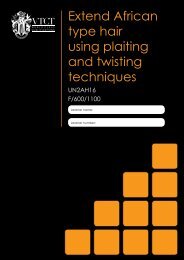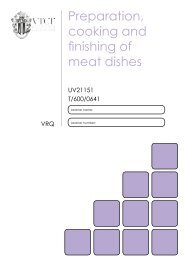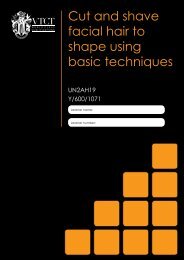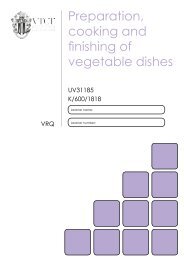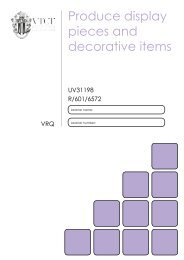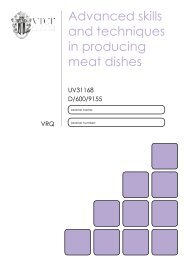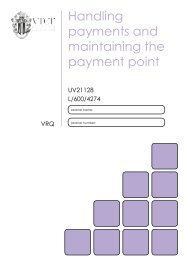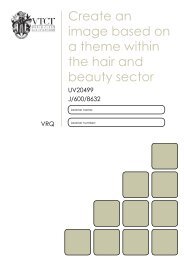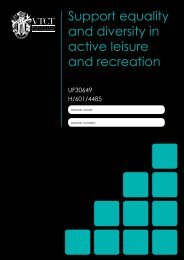Develop productive working relationships with colleagues and ...
Develop productive working relationships with colleagues and ...
Develop productive working relationships with colleagues and ...
You also want an ePaper? Increase the reach of your titles
YUMPU automatically turns print PDFs into web optimized ePapers that Google loves.
<strong>Develop</strong><br />
<strong>productive</strong> <strong>working</strong><br />
<strong>relationships</strong> <strong>with</strong><br />
<strong>colleagues</strong> <strong>and</strong><br />
stakeholders<br />
UF30745<br />
A/502/9287<br />
Learner name:<br />
Learner number:
Statement of unit achievement<br />
VTCT is the specialist awarding body for the Hairdressing, Beauty Therapy,<br />
Complementary Therapy <strong>and</strong> Sport <strong>and</strong> Active Leisure sectors, <strong>with</strong> over 45<br />
years of experience.<br />
VTCT is an awarding body regulated by national organisations including<br />
Ofqual, SQA, DCELLS <strong>and</strong> CCEA.<br />
VTCT is a registered charity investing in education <strong>and</strong> skills but also giving to<br />
good causes in the area of facial disfigurement.<br />
By signing this statement of unit achievement you are confirming that all learning outcomes, assessment<br />
criteria <strong>and</strong> range statements have been achieved under specified conditions <strong>and</strong> that the evidence<br />
gathered is authentic.<br />
This statement of unit achievement table must be completed prior to claiming certification.<br />
Unit code Date achieved Learner signature<br />
Assessor tracking table<br />
Assessor name Assessor signature<br />
Assessor<br />
initials<br />
Assessors<br />
initials<br />
IV signature<br />
(if sampled)<br />
All assessors using this Record of Assessment book must complete this table. This is required for<br />
verification purposes.<br />
Assessor number<br />
(optional)
UF30745<br />
<strong>Develop</strong> <strong>productive</strong> <strong>working</strong><br />
<strong>relationships</strong> <strong>with</strong> <strong>colleagues</strong> <strong>and</strong><br />
stakeholders<br />
The aim of this unit is to develop the knowledge,<br />
underst<strong>and</strong>ing <strong>and</strong> practical skills required to establish<br />
good <strong>working</strong> <strong>relationships</strong>, resolve conflicts, <strong>and</strong> monitor<br />
<strong>and</strong> review the relationship you have <strong>with</strong> <strong>colleagues</strong> <strong>and</strong><br />
stakeholders.<br />
UF30745_v6
NOS<br />
A324<br />
Level<br />
Credit value<br />
GLH<br />
3<br />
4<br />
22<br />
Observation(s)<br />
2<br />
External paper(s)<br />
0
<strong>Develop</strong> <strong>productive</strong> <strong>working</strong><br />
<strong>relationships</strong> <strong>with</strong> <strong>colleagues</strong> <strong>and</strong><br />
stakeholders<br />
Learning outcomes Evidence requirements<br />
On completion of this unit you will:<br />
1. Be able to establish <strong>working</strong> <strong>relationships</strong><br />
<strong>with</strong> <strong>colleagues</strong> <strong>and</strong> stakeholders<br />
2. Be able to work <strong>with</strong> <strong>colleagues</strong> <strong>and</strong><br />
stakeholders<br />
3. Be able to review <strong>relationships</strong> <strong>with</strong><br />
<strong>colleagues</strong> <strong>and</strong> stakeholders<br />
4. Underst<strong>and</strong> the benefits of <strong>productive</strong><br />
<strong>working</strong> <strong>relationships</strong> <strong>with</strong> <strong>colleagues</strong> <strong>and</strong><br />
stakeholders<br />
5. Underst<strong>and</strong> the organisational context for<br />
<strong>working</strong> <strong>relationships</strong><br />
6. Underst<strong>and</strong> how to identify key stakeholders<br />
7. Underst<strong>and</strong> conflict resolution in relation to<br />
<strong>colleagues</strong> <strong>and</strong> stakeholders<br />
8. Underst<strong>and</strong> how to work <strong>with</strong> <strong>colleagues</strong><br />
<strong>and</strong> stakeholders<br />
9. Underst<strong>and</strong> how to monitor <strong>and</strong> review<br />
<strong>relationships</strong> <strong>with</strong> <strong>colleagues</strong> <strong>and</strong><br />
stakeholders<br />
1. Evidence of real work activity<br />
You must produce evidence to meet all<br />
‘Observation’ outcomes <strong>and</strong> assessment<br />
criteria through your own work.<br />
2. Simulation<br />
Simulation is not allowed in this unit.<br />
3. Observation outcomes<br />
Competent performance of ‘Observation’<br />
outcomes must be demonstrated on at least<br />
two occasions. Assessor observations,<br />
witness testimony <strong>and</strong> products of work are<br />
likely to be the most appropriate sources of<br />
performance evidence. These observations<br />
should not be carried out on the same day.<br />
There should be sufficient time between<br />
assessments. Separating the assessment<br />
occasions by a period of at least one month<br />
is recommended.<br />
4. Knowledge outcomes<br />
There must be evidence that you possess<br />
all the knowledge <strong>and</strong> underst<strong>and</strong>ing listed<br />
in the ‘Knowledge’ section of this unit.<br />
In most cases this can be done by your<br />
assessor questioning you orally. However,<br />
other techniques such as projects,<br />
assignments <strong>and</strong>/or reflective accounts may<br />
also be appropriate.<br />
5. Tutor/Assessor guidance<br />
You will be guided by your tutor/assessor<br />
on how to achieve learning outcomes in this<br />
unit. All outcomes must be achieved.<br />
6. External paper<br />
There is no external paper requirement for<br />
this unit.<br />
UF30745<br />
3
4<br />
Achieving observations<br />
<strong>and</strong> range<br />
Achieving observation outcomes<br />
Your assessor will observe your performance<br />
of practical tasks. The minimum number<br />
of observations required is indicated in the<br />
evidence requirements section of this unit.<br />
Criteria may not always naturally occur during<br />
a practical observation. In such instances you<br />
may be required to produce supplementary<br />
evidence, for example, questioning, projects or<br />
assignments may be used to demonstrate your<br />
competence in this area. Your assessor will<br />
document the criteria that have been achieved<br />
by supplementary evidence. Questioning to<br />
gather supplementary evidence can normally<br />
be carried out orally. However, oral questioning<br />
must be recorded by the assessor, in written<br />
form or by other appropriate means.<br />
Your assessor will sign off an outcome when all<br />
criteria have been competently achieved.<br />
Achieving range<br />
There are no range statements that apply to this<br />
unit.<br />
UF30745<br />
Guidance for tutors <strong>and</strong> assessors<br />
Tutors <strong>and</strong> assessors must refer to the<br />
following documents for guidance on<br />
assessment prior to delivering this unit. *These<br />
SkillsActive documents can be downloaded at<br />
www.SkillsActive.com:<br />
• QCF Evidence Requirements <strong>and</strong><br />
Assessment Guidance<br />
• Assessment Strategy for NVQs <strong>and</strong><br />
SVQs<br />
• Additional Requirements for<br />
Qualifications that use the title NVQ<br />
<strong>with</strong>in the QCF<br />
*Learning outcomes <strong>and</strong> assessment criteria in<br />
these documents may be numbered differently<br />
to VTCT ROA books.
Outcome 1<br />
Observations<br />
Be able to establish <strong>working</strong> <strong>relationships</strong> <strong>with</strong> <strong>colleagues</strong> <strong>and</strong><br />
stakeholders<br />
You can:<br />
a. Evaluate the background to, <strong>and</strong> nature of,<br />
key stakeholders’ interest in the activities<br />
<strong>and</strong> performance of the organisation<br />
b. Establish <strong>working</strong> <strong>relationships</strong> <strong>with</strong><br />
relevant <strong>colleagues</strong> <strong>and</strong> stakeholders<br />
c. Identify key stakeholders for own area of<br />
responsibility<br />
*May be assessed by supplementary evidence.<br />
Observation 1 2 Optional<br />
Criteria questioned orally<br />
Date achieved<br />
Portfolio reference<br />
Learner signature<br />
Assessor initials<br />
UF30745<br />
5
6<br />
Outcome 2<br />
Be able to work <strong>with</strong> <strong>colleagues</strong> <strong>and</strong> stakeholders<br />
You can:<br />
a. Respect the roles, responsibilities,<br />
interests <strong>and</strong> concerns of <strong>colleagues</strong> <strong>and</strong><br />
stakeholders when undertaking own work<br />
b. Provide <strong>colleagues</strong> <strong>and</strong> stakeholders <strong>with</strong><br />
appropriate information to enable them to<br />
perform effectively<br />
c. Consult <strong>colleagues</strong> <strong>and</strong> stakeholders in<br />
relation to key decisions <strong>and</strong> activities<br />
d. Take account of <strong>colleagues</strong>’ <strong>and</strong><br />
stakeholders’ views, including their<br />
priorities, expectations <strong>and</strong> attitudes to<br />
potential risks<br />
e. Fulfil agreements made <strong>with</strong> <strong>colleagues</strong> <strong>and</strong><br />
stakeholders, while keeping them informed<br />
of progress<br />
f. Advise <strong>colleagues</strong> <strong>and</strong> stakeholders<br />
promptly of any difficulties or where it will be<br />
impossible to fulfil agreements<br />
g. Resolve conflicts of interest <strong>and</strong><br />
disagreements <strong>with</strong> <strong>colleagues</strong> <strong>and</strong><br />
stakeholders in ways that minimise damage<br />
to work <strong>and</strong> activities <strong>and</strong> to the individuals<br />
<strong>and</strong> organisations involved<br />
*May be assessed by supplementary evidence.<br />
Observation 1 2 Optional<br />
Criteria questioned orally<br />
Date achieved<br />
Portfolio reference<br />
Learner signature<br />
Assessor initials<br />
UF30745
Outcome 3<br />
Be able to review <strong>relationships</strong> <strong>with</strong> <strong>colleagues</strong> <strong>and</strong><br />
stakeholders<br />
You can:<br />
a. Monitor the effectiveness of <strong>working</strong><br />
<strong>relationships</strong> <strong>with</strong> <strong>colleagues</strong> <strong>and</strong><br />
stakeholders<br />
b. Review <strong>working</strong> <strong>relationships</strong> <strong>with</strong><br />
<strong>colleagues</strong> <strong>and</strong> stakeholders, seeking <strong>and</strong><br />
providing feedback, in order to identify<br />
areas for improvement<br />
c. Monitor wider developments in order to<br />
identify issues of potential interest or<br />
concern to stakeholders in the future, <strong>and</strong> to<br />
identify new stakeholders<br />
*May be assessed by supplementary evidence.<br />
Observation 1 2 Optional<br />
Criteria questioned orally<br />
Date achieved<br />
Portfolio reference<br />
Learner signature<br />
Assessor initials<br />
UF30745<br />
7
8<br />
<strong>Develop</strong>ing knowledge<br />
Achieving knowledge outcomes<br />
You will be guided by your tutor <strong>and</strong> assessor<br />
on the evidence that needs to be produced.<br />
Your knowledge <strong>and</strong> underst<strong>and</strong>ing will be<br />
assessed using the assessment methods listed<br />
below:<br />
• Observed work<br />
• Witness statements<br />
• Audio-visual media<br />
• Evidence of prior learning or attainment<br />
• Written questions<br />
• Oral questions<br />
• Assignments<br />
• Case studies<br />
UF30745<br />
Where possible your assessor will integrate<br />
knowledge outcomes into practical observations<br />
through oral questioning. Oral questioning must<br />
be recorded by your assessor, in written form or<br />
by other appropriate means.<br />
Some knowledge <strong>and</strong> underst<strong>and</strong>ing outcomes<br />
may require you to show that you know <strong>and</strong><br />
underst<strong>and</strong> how to do something. If you have<br />
practical evidence from your own work, then<br />
there is no requirement for you to be questioned<br />
again on the same topic.
Knowledge<br />
Outcome 4<br />
Underst<strong>and</strong> the benefits of <strong>productive</strong> <strong>working</strong> <strong>relationships</strong><br />
<strong>with</strong> <strong>colleagues</strong> <strong>and</strong> stakeholders<br />
You can: Portfolio reference<br />
a. Summarise the benefits of developing <strong>productive</strong> <strong>working</strong><br />
<strong>relationships</strong> <strong>with</strong> <strong>colleagues</strong> <strong>and</strong> stakeholders<br />
UF30745 9
10<br />
Outcome 5<br />
Underst<strong>and</strong> the organisational context for <strong>working</strong><br />
<strong>relationships</strong><br />
You can: Portfolio reference<br />
a. Summarise the following in relation to own organisation:<br />
• vision<br />
• values<br />
• objectives<br />
• plans<br />
• structure<br />
• culture<br />
b. Identify <strong>colleagues</strong>, <strong>and</strong> their work roles <strong>and</strong> responsibilities,<br />
relevant to own work<br />
c. Identify relevant stakeholders, their background <strong>and</strong> interest in the<br />
activities <strong>and</strong> performance of the organisation<br />
d. Summarise relevant agreements <strong>with</strong> <strong>colleagues</strong> <strong>and</strong> stakeholders<br />
e. Explain the mechanisms for consulting <strong>with</strong> <strong>colleagues</strong> <strong>and</strong><br />
stakeholders on key decisions <strong>and</strong> activities<br />
f. Summarise the organisation’s planning <strong>and</strong> decision-making<br />
processes<br />
g. Explain the organisational mechanisms for communicating <strong>with</strong><br />
<strong>colleagues</strong> <strong>and</strong> stakeholders<br />
h. Evaluate the role of power, influence <strong>and</strong> politics <strong>with</strong>in the<br />
organisation<br />
i. Summarise the st<strong>and</strong>ards of behaviour <strong>and</strong> performance that are<br />
expected in the organisation<br />
UF30745
Outcome 6<br />
Underst<strong>and</strong> how to identify key stakeholders<br />
You can: Portfolio reference<br />
a. Explain the key principles which underpin the ‘stakeholder’ concept<br />
b. Evaluate different types of stakeholder<br />
c. Explain how to identify an organisation’s stakeholders, including<br />
background information <strong>and</strong> the nature of their interest in the<br />
organisation<br />
UF30745 11
12<br />
Outcome 7<br />
Underst<strong>and</strong> conflict resolution in relation to <strong>colleagues</strong> <strong>and</strong><br />
stakeholders<br />
You can: Portfolio reference<br />
a. Explain how to manage the expectations of <strong>colleagues</strong> <strong>and</strong><br />
stakeholders<br />
b. Describe the types of conflict that may occur <strong>with</strong> <strong>colleagues</strong> <strong>and</strong><br />
stakeholders<br />
c. Explain the damage which conflicts of interest <strong>and</strong> disagreements<br />
<strong>with</strong> <strong>colleagues</strong> <strong>and</strong> stakeholders can cause to individuals <strong>and</strong><br />
organisations<br />
d. Evaluate different techniques for conflict resolution <strong>with</strong> <strong>colleagues</strong><br />
<strong>and</strong> stakeholders<br />
UF30745
Outcome 8<br />
Underst<strong>and</strong> how to work <strong>with</strong> <strong>colleagues</strong> <strong>and</strong> stakeholders<br />
You can: Portfolio reference<br />
a. Summarise the principles of effective communication <strong>with</strong><br />
<strong>colleagues</strong> <strong>and</strong> stakeholders<br />
b. Explain why it is important to recognise <strong>and</strong> respect the roles,<br />
responsibilities, interests <strong>and</strong> concerns of <strong>colleagues</strong> <strong>and</strong><br />
stakeholders<br />
c. Describe the types of information it is appropriate to provide to<br />
<strong>colleagues</strong> <strong>and</strong> stakeholders, <strong>and</strong> the factors that need to be taken<br />
into consideration when doing so<br />
d. Explain the importance of taking account, <strong>and</strong> being seen to take<br />
account, of the views of <strong>colleagues</strong> <strong>and</strong> stakeholders, particularly<br />
in relation to their priorities, expectations <strong>and</strong> attitudes to potential<br />
risks<br />
e. Explain why communication <strong>with</strong> <strong>colleagues</strong> <strong>and</strong> stakeholders on<br />
fulfilment of agreements, or any problems affecting or preventing<br />
fulfilment is important<br />
f. Explain how to take account of diversity issues when developing<br />
<strong>working</strong> <strong>relationships</strong> <strong>with</strong> <strong>colleagues</strong> <strong>and</strong> stakeholders<br />
g. Explain how to recognise <strong>and</strong> take account of political issues when<br />
dealing <strong>with</strong> <strong>colleagues</strong> <strong>and</strong> stakeholders<br />
UF30745 13
14<br />
Outcome 9<br />
Underst<strong>and</strong> how to monitor <strong>and</strong> review <strong>relationships</strong> <strong>with</strong><br />
<strong>colleagues</strong> <strong>and</strong> stakeholders<br />
You can: Portfolio reference<br />
a. Explain how to monitor <strong>and</strong> evaluate the effectiveness of <strong>working</strong><br />
<strong>relationships</strong> <strong>with</strong> <strong>colleagues</strong> <strong>and</strong> stakeholders<br />
b. Describe how to obtain, <strong>and</strong> make effective use of, feedback on<br />
the effectiveness of <strong>working</strong> <strong>relationships</strong> from <strong>colleagues</strong> <strong>and</strong><br />
stakeholders<br />
c. Explain how to provide <strong>colleagues</strong> <strong>and</strong> stakeholders <strong>with</strong> useful<br />
feedback on the effectiveness of <strong>working</strong> <strong>relationships</strong><br />
d. Summarise the importance of monitoring wider developments in<br />
relation to stakeholders<br />
e. Explain how to effectively monitor wider developments in relation<br />
to stakeholders<br />
UF30745


